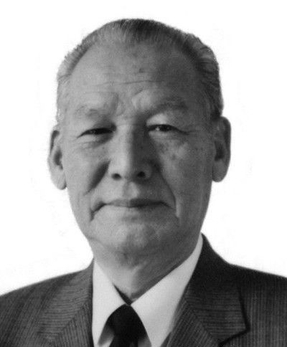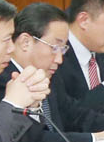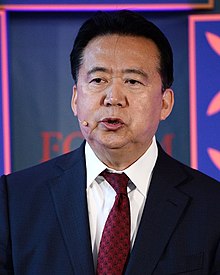Contents
- Early life and career
- Interpol
- Corruption accusations
- Secret detention
- Prosecution
- See also
- References
- External links
Early life and career
Meng was born in Harbin, Heilongjiang, in 1953. [4] He entered the workforce in 1972 and joined the Chinese Communist Party (CCP) in 1975. [5] He graduated from Peking University with a bachelor's degree in law in 1983 [5]
He has 40 years of experience in criminal justice and policing. [6] He served as Vice-Minister of Public Security from 2004 [5] until his arrest in 2018. He served as Director of the Maritime Police Bureau and deputy director of China's State Oceanic Administration from 2013 until 2017. [5] In April 2018, without explanation, he was relieved of his membership of the CCP committee at the Ministry of Public Security. It was unclear whether this was due to his declining political fortunes or due to his age. [4]
Interpol
In 2004, Meng became the head of Interpol's China branch. [4]
He was elected as President of Interpol on 10 November 2016, [7] becoming the first Chinese head of the agency. His election was viewed as a success for China's ambitions to gain influence within international organisations. [8] Dissidents feared that China would use Meng to track exiled opponents. [9] During his presidency, the Chinese government submitted extensive lists of officials and business people wanted for questioning on allegations of corruption, which critics claimed were politically motivated. His term as president was due to last until 2020, but he resigned in October 2018 after being detained by Chinese authorities. [10]
Corruption accusations
Secret detention
Meng left Sweden on 18 September 2018, and landed in China on a flight from Stockholm on 19 September. On September 25, Meng sent his wife Grace an emoji of a knife, suggesting that he was in danger. [11] [12] The South China Morning Post reported that Meng had been taken away for questioning by "discipline authorities" on his arrival in China. [6] French newspaper Le Parisien added that he was under investigation in China, suspected of favouring a company in a cybersecurity procurement. [9]
On 4 October, Mrs. Meng reported her husband missing to the French police. [6] She was given police protection after being threatened by phone and Internet. As of January 2019 [update] , Mrs. Meng was seeking asylum in France. [13] [14]
Prosecution
On 6 October 2018, Interpol officially demanded to know Meng's status from the Chinese government. [8] The next day, the Central Commission for Discipline Inspection announced that Meng was being investigated by the National Supervisory Commission, an anti-corruption agency, for allegedly taking bribes, [8] [15] and that a task force would be set up to pursue his alleged associates. Meng was also accused of "willfulness", which public administration expert Zhu Lijia said might indicate that he "may not have strictly toed the party lines". [16]
Interpol also received Meng's letter of resignation, with immediate effect, and said the organisation's acting senior vice president, Kim Jong Yang of South Korea, would be acting president until a permanent replacement was elected at a meeting in Dubai in November 2018. [8] [17] [18] Interpol's press release did not mention whether Meng had resigned under duress. [10] Grace Meng has threatened Interpol with legal action over its lack of investigation into the authenticity of the resignation. [1]
On 26 October 2018, Meng was removed from the Chinese People's Political Consultative Conference, China's top political advisory body. [19] On 27 March 2019, the Central Commission for Discipline Inspection and the National Supervisory Commission announced that Meng was expelled from the CCP and removed from all posts. [20]
In April 2019, Meng's wife sued Interpol for failing to assist her at the Permanent Court of Arbitration. [21] In 2021, she criticised the Chinese government as being "a monster" because she said in a figurative sense that, "they eat their children". She said the charges of accepting bribes were "trumped up", and that the CCP really purged him because "he used his high-profile position to push for change". "It's a fake case. It's an example of a political disagreement being turned into a criminal affair. The extent of corruption in China today is extremely serious. It's everywhere. But there are two different opinions about how to solve corruption. One is the method used now. The other is to move toward constitutional democracy, to solve the problem at its roots." [22] [23]
On 24 April 2019, a statement by the Supreme People's Procuratorate said that prosecutors "decided to arrest Meng Hongwei on suspicion of accepting bribes". [24] On 20 June 2019, he pleaded guilty for accepting bribes over 14.5 million yuan or $2.11 million. [25] He was sentenced on 21 January 2020 to 13½ years of jail time and fined CNY 2 million for the accepting of bribes and abusing his position. [3] [26] He did not apply for appeal to the court sentence. [26]
See also
Related Research Articles

Meng is a Chinese surname. Meng is a shi surname or clan name (氏), as opposed to the xing (姓) category of surname, ancestral name. Meng is of the type of surname which was a member of the list of names denoting seniority within a certain family: in ancient usage, the characters of meng (孟), zhong (仲), shu (叔) and ji (季) were used to denote the first, second, third and fourth eldest sons in a family. These were sometimes adopted as surnames. Of these, Meng is the best known, being the surname of the philosopher Mencius. It is the 94th name on the Hundred Family Surnames poem.

The Central Political and Legal Affairs Commission (CPLC), commonly referred to as Zhongyang Zhengfawei in Chinese, is the organization under the Central Committee of the Chinese Communist Party (CCP) responsible for "political and legal affairs". Based on the principles of Leninism and democratic centralism, the organization acts as the overseer and coordinator of all legal enforcement authorities, including the Ministries of State Security, Public Security and Justice, as well as the Supreme People's Court and Supreme People's Procuratorate. All provincial, municipal, county and autonomous region CCP committees have their own political and legal affairs commissions.

Liu Fuzhi was a politician of the People's Republic of China. He served as the Procurator-General of the Supreme People's Procuratorate, Minister of Public Security, and Minister of Justice.

The International Criminal Police Organization – INTERPOL, commonly known as Interpol, is an international organization that facilitates worldwide police cooperation and crime control. It is the world's largest international police organization. It is headquartered in Lyon, France, with seven regional bureaus worldwide, and a National Central Bureau in all 196 member states.
Su Rong is a former senior regional official and politician in China. He began his career in his native Jilin, and successively served as Chinese Communist Party Committee Secretary of Qinghai, Gansu, and Jiangxi provinces. In March 2013, he became one of the vice-chairmen of the Chinese People's Political Consultative Conference (CPPCC).
Shuanggui is an internal disciplinary process conducted by the Central Commission for Discipline Inspection of the Chinese Communist Party (CCP) – and its lower-level affiliates – on CCP members who are suspected of "violations of discipline," a charge which usually refers to corruption but can occasionally carry other connotations as well. The Shuanggui process is conducted in secret, in a system which is separate from ordinary Chinese law enforcement. Generally, subjects are isolated from any form of legal counsel or even family visits during the process. Some journalists maintain that the practice has been involved in extraordinary renditions. It is an extrajudicial process outside of the control of the Chinese state.
Li Dongsheng was a Vice Minister of China's Ministry of Public Security and a member of the Central Committee of the Chinese Communist Party. He oversaw the office in charge of suppressing the Falun Gong and other banned spiritual groups. Seen as an associate of Zhou Yongkang, Li was investigated for corruption allegations in 2013 and charged with abuse of power and bribery. In 2016, he was sentenced to 15 years in prison.
Liu Jinguo is a Chinese politician and public security official who is the current director of the National Supervisory Commission and a secretary of the Secretariat of the Chinese Communist Party. Since 2014 he has served as Deputy Secretary of the Central Commission for Discipline Inspection. Previously he held various senior posts at the Ministry of Public Security.

Fu Zhenghua is a former Chinese politician and public security officer. He was convicted of taking bribes and bending the law for personal gain in September 2022, and was sentenced to life imprisonment.
Ma Jian is a former Chinese security official. In January 2015, he was put under investigation by the Chinese Communist Party's Central Commission for Discipline Inspection. He served as the vice minister of State Security, and also vice president of the China Law Society. He was a member of the 12th National Committee of the Chinese People's Political Consultative Conference, but is currently in prison serving a life sentence for corruption.
Ye Jianming is a Chinese businessman. He is the founder and former chairman of CEFC China Energy Company Limited, a now defunct company that used to be a Global Fortune 500 energy and finance conglomerate. He has been under detention in China since March 2018 on charges of bribery.

Wang Xiaohong is a Chinese politician who has been serving as the Minister of Public Security of China since June 2022 and State Councilor of China since March 2023.
Ai Wenli is a former Chinese politician who served as the Vice-Chairman of the Hebei Provincial Committee of the Chinese People's Political Consultative Conference. Previously, he served as the head of the Propaganda Department of the Chinese Communist Party Hebei Committee and the Mayor of Shijiazhuang. He was placed under investigation by the Central Commission for Discipline Inspection and the National Supervisory Commission shortly after his retirement. Ai is the first leader of vice-ministerial level to spontaneously hand himself in to the anti-corruption agency of China after the implementation of Supervision Law in March 2018.
Kim Jong Yang is a South Korean politician and police officer who was the 29th president of Interpol from 2018 to 2021.
Tong Daochi is a former Chinese politician who served as Chinese Communist Party Committee Secretary of Sanya between November 2018 and October 2020. He was a member of the Standing Committee of the Hainan Provincial Committee of the Chinese Communist Party. He was investigated by the Central Commission for Discipline Inspection in November 2020.
Sun Lijun is a former Chinese politician and police officer. He was investigated by the Chinese Communist Party's anti-graft agency in April 2020 and was given the death sentence with reprieve for bribery and corruption in September 2022. Sun Lijun was affiliated with a group of other corrupt officials associated with Jiang Zemin.
Liu Xinyun is a former Chinese politician who spent most of his career in his home-province Shandong. He was investigated by China's top anti-graft agency in April 2021. In September 2022, he was sentenced to 14 years in prison for bribery and abuse of power. Previously he served as vice governor of Shanxi and head of Shanxi Public Security Department. Liu is one of several senior-ranking police officers to be investigated in a years-long anti-corruption battle started by Chinese Communist Party (CCP) general secretary Xi Jinping that swept China's domestic security apparatus.
Meng Yongshan is a former Chinese procurator. As of June 2021 he was under investigation by China's top anti-corruption agency. Previously he served as chief prosecutor and party branch secretary of Qinghai People's Procuratorate.
Liu Yanping is a Chinese politician who served as vice minister of Public Security between 2013 and 2015. From 2015 onwards he served as the secretary of the Central Discipline Inspection Committee within the Ministry of State Security (MSS). In March 2022 Chinese state media reported that Liu had been placed under investigation by the CCDI for "violations of law and party discipline". He is the 12th high-ranking official in China to be targeted by China's top anticorruption watchdog in 2022. Liu crossed paths with Li Dongsheng, Meng Hongwei and Fu Zhenghua, and was known to be a close ally of Sun Lijun.

The minister of public security is a member of the State Council of the People's Republic of China and the head of the Ministry of Public Security (MPS). The position reports directly to the head of the Central Political and Legal Affairs Commission (CPLC) of the Chinese Communist Party. Within the State Council, the position is eight in order of precedence.
References
- 1 2 Graham-Harrison, Emma (2018-11-18). "'It's not justice': wife of detained Interpol chief faces down China". The Guardian . ISSN 0261-3077. Archived from the original on 2018-11-18. Retrieved 2018-11-18.
- ↑ "China accuses ex-Interpol chief Meng of bribery and corruption". Al Jazeera . 8 October 2018. Archived from the original on 21 November 2018. Retrieved 8 October 2018.
- 1 2 "Former Interpol president jailed for 13 years over bribery charges". ABC News . 2020-01-21. Archived from the original on 2020-01-22. Retrieved 2020-02-07.
- 1 2 3 "Missing Interpol president deeply rooted in China's security". The Washington Post . Associated Press. 5 October 2018. Archived from the original on 6 October 2018. Retrieved 6 October 2018.
- 1 2 3 4 "Meng Hongwei 孟宏伟". China Vitae. Carnegie Endowment for International Peace. Archived from the original on 30 August 2019. Retrieved 5 October 2018.
- 1 2 3 "Interpol chief Meng Hongwei vanishes on trip to China". BBC News. 5 October 2018. Archived from the original on 5 October 2018. Retrieved 5 October 2018.
- ↑ 公安部副部长孟宏伟当选新一任国际刑警组织主席 [Deputy Minister of Public Security Meng Hongwei Elected New Interpol Chairman] (in Chinese). Xinhuanet. 10 November 2016. Archived from the original on 10 November 2016. Retrieved 10 November 2016.
- 1 2 3 4 Wong, Edward; Rubin, Alissa J. (7 October 2018). "Interpol President is Detained by China and has Quit His Post". The New York Times . Archived from the original on 13 May 2020. Retrieved 7 October 2018.
- 1 2 "Le président d'Interpol soupçonné de corruption par la Chine". Le Parisien (in French). 6 October 2018. Archived from the original on 6 October 2018. Retrieved 6 October 2018.
- 1 2 Gerry Shih; James McAuley (8 October 2018). "Interpol president who vanished in China has resigned". The Washington Post. Archived from the original on 22 November 2018. Retrieved 8 October 2018.
- ↑ Rudy Ruitenberg; Lynn Chen (7 October 2018). "Interpol President Is Being Probed for Illegal Conduct, China Says". Bloomberg. Archived from the original on 8 October 2018. Retrieved 7 October 2018.
- ↑ John Leicester; Gillian Wong (7 October 2018). "Wife says Interpol officer sent knife image as danger signal". AP News. Archived from the original on 8 October 2018. Retrieved 7 October 2018.
- ↑ "Meng Hongwei: Wife of ex-Interpol chief seeks France asylum". BBC . 18 January 2019. Archived from the original on 8 November 2020. Retrieved 9 March 2020.
- ↑ Chris Buckley; Aurelien Breedon (5 October 2018). "Head of Interpol Disappears, and Eyes Turn Toward China". The New York Times. Archived from the original on 9 March 2020. Retrieved 6 October 2018.
- ↑ "Meng Hongwei: China accuses Interpol chief of bribery". BBC News. 8 October 2018. Archived from the original on 9 October 2018. Retrieved 9 October 2018.
- ↑ Choi Chi-yuk; Matt Ho (8 October 2018). "China accuses former Interpol chief Meng Hongwei of taking bribes". South China Morning Post . Archived from the original on 16 November 2018. Retrieved 9 October 2018.
- ↑ Express Web Desk (8 October 2018). "Missing Interpol President Meng Hongwei resigns, new chief to be elected in November". Indian Express. Archived from the original on 8 October 2018. Retrieved 8 October 2018.
- ↑ Eliott C. McLaughlin; Saskya Vandoorne; Ben Westcott (8 October 2018). "Chinese government admits head of Interpol 'under investigation' after disappearance". CNN. Archived from the original on 8 October 2018. Retrieved 8 October 2018.
- ↑ 公安部原副部长孟宏伟被撤销政协委员资格 [Former vice-minister of Public Security Meng Hongwei is being disqualified from the Chinese People's Political Consultative Conference]. ifeng (in Chinese). 2018-10-27. Archived from the original on 2018-10-29. Retrieved 2018-10-29.
- ↑ "公安部原党委委员、副部长孟宏伟严重违纪违法被开除党籍和公职". Central Commission for Discipline Inspection. 2019-03-27. Archived from the original on 2019-03-27. Retrieved 2019-03-27.
- ↑ "Wife of ex-Interpol chief sues agency, accuses it of 'complicity with China'". South China Morning Post. 2019-07-07. Archived from the original on 2019-07-07. Retrieved 2019-07-07.
- ↑ "Wife of missing Chinese official calls government a "monster," "they eat their children"". Newsweek. 2021-11-18. Archived from the original on 2021-12-10. Retrieved 2021-12-10.
- ↑ Leicester, John (2021-11-18). "Wife of former Interpol chief takes on China government". The New Zealand Herald. The Associated Press. Archived from the original on 2021-12-10. Retrieved 2021-12-10.
- ↑ "China formally arrests ex-Interpol chief". SinoDaily.com. 24 April 2019. Archived from the original on 24 January 2020. Retrieved 9 March 2020.
- ↑ "Former Interpol chief admits guilt in Chinese court hearing". Asahi Shimbun . Reuters. 20 June 2019. Archived from the original on 12 November 2020. Retrieved 9 March 2020.
- 1 2 "Chinese court jails former Interpol chief for 13-1/2 years over graft". Reuters . 20 January 2020. Archived from the original on 27 March 2020. Retrieved 9 March 2020.
External links
-
 Media related to Meng Hongwei at Wikimedia Commons
Media related to Meng Hongwei at Wikimedia Commons
Meng Hongwei | |
|---|---|
孟宏伟 | |
 Meng Hongwei | |
| President of Interpol | |
| In office 10 November 2016 –7 October 2018 |